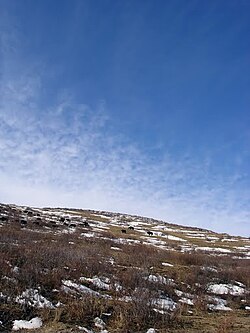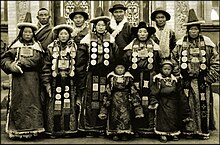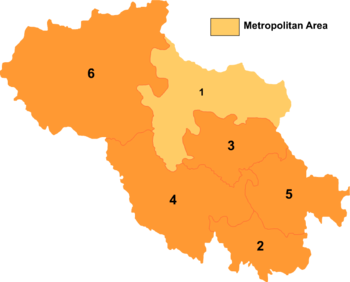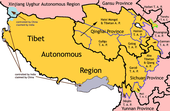Golog Tibetan Autonomous Prefecture: Difference between revisions
Salmoonlight (talk | contribs) No edit summary |
Pislikeller (talk | contribs) No edit summary |
||
| Line 1: | Line 1: | ||
{{redirect|Golog|other uses|Golog (disambiguation)}} |
{{redirect|Golog|the people living here|Golok people|other uses|Golog (disambiguation)}} |
||
{{Infobox settlement |
{{Infobox settlement |
||
|name = Golog Prefecture |
|name = Golog Prefecture |
||
| Line 120: | Line 120: | ||
|footnotes = |
|footnotes = |
||
}} |
}} |
||
'''Golog''' ('''Golok'''<ref>{{Cite news|url=http://tibet.net/2017/09/flooded-tibet-struggling-to-adapt-to-the-new-reality/|title=Flooded Tibet: struggling to adapt to the new reality|work=Central Tibetan Administration|access-date=2017-12-23|archive-url=https://web.archive.org/web/20170904111255/http://tibet.net/2017/09/flooded-tibet-struggling-to-adapt-to-the-new-reality/|archive-date=4 September 2017|language=en-US|quote="On 30 August 2017, a massive landslide buried nine people in Golok Machen region of north eastern Tibet."}}</ref> or '''Guoluo''') |
'''Golog''' ('''Golok'''<ref>{{Cite news|url=http://tibet.net/2017/09/flooded-tibet-struggling-to-adapt-to-the-new-reality/|title=Flooded Tibet: struggling to adapt to the new reality|work=Central Tibetan Administration|access-date=2017-12-23|archive-url=https://web.archive.org/web/20170904111255/http://tibet.net/2017/09/flooded-tibet-struggling-to-adapt-to-the-new-reality/|archive-date=4 September 2017|language=en-US|quote="On 30 August 2017, a massive landslide buried nine people in Golok Machen region of north eastern Tibet."}}</ref> or '''Guoluo''') '''Tibetan Autonomous Prefecture''' ({{zh|c=果洛藏族自治州 |p=Guǒluò Zàngzú Zìzhìzhōu}}; {{bo|t=མགོ་ལོག་བོད་རིགས་རང་སྐྱོང་ཁུལ་|w=Mgo-log Bod-rigs rang-skyong-khul|en=Golok}}) is an [[autonomous prefecture]] occupying the southeastern corner of [[Qinghai]] province, [[China]]. The prefecture has an [[area]] of {{convert|76,312|km2|abbr=on}} and its [[Capital (political)|seat]] is located in [[Maqên County]]. Due to its special geographical location and natural environment, the entire autonomous preference has been included in the Chinese largest natural environmental protection area — the [[Sanjiangyuan|Sanjiangyuan National Park]].<ref>{{Cite journal|title=Qinghai and the emergence of the west: Nationalities, communal interaction and national integration|journal=The China Quarterly; Cambridge}}</ref> |
||
==Geography== |
==Geography== |
||
Latest revision as of 18:11, 21 November 2024
Golog Prefecture
果洛州 · མགོ་ལོག་ཁུལ། | |
|---|---|
果洛藏族自治州 · མགོ་ལོག་བོད་རིགས་རང་སྐྱོང་ཁུལ་ Golog Tibetan Autonomous Prefecture | |
 Eastern Golog Tibetan Autonomous Prefecture | |
 Location of Golog Tibetan Autonomous Prefecture in Qinghai | |
| Coordinates: 34°07′N 99°19′E / 34.117°N 99.317°E | |
| Country | China |
| Province | Qinghai |
| Prefecture seat | Maqên County (Dawu) |
| Area | |
• Total | 74,246 km2 (28,667 sq mi) |
| Population | |
• Total | 215,600 |
| • Density | 2.9/km2 (7.5/sq mi) |
| GDP[1] | |
| • Total | CN¥ 3.6 billion US$ 0.6 billion |
| • Per capita | CN¥ 18,238 US$ 2,928 |
| Time zone | UTC+8 (China Standard) |
| ISO 3166 code | CN-QH-26 |
| Website | www |
Golog (Golok[2] or Guoluo) Tibetan Autonomous Prefecture (Chinese: 果洛藏族自治州; pinyin: Guǒluò Zàngzú Zìzhìzhōu; Tibetan: མགོ་ལོག་བོད་རིགས་རང་སྐྱོང་ཁུལ་, Wylie: Mgo-log Bod-rigs rang-skyong-khul) is an autonomous prefecture occupying the southeastern corner of Qinghai province, China. The prefecture has an area of 76,312 km2 (29,464 sq mi) and its seat is located in Maqên County. Due to its special geographical location and natural environment, the entire autonomous preference has been included in the Chinese largest natural environmental protection area — the Sanjiangyuan National Park.[3]
Geography
[edit]Golog Prefecture is located in the southeastern part of Qinghai, in the upper basin of the Yellow River. Gyaring Lake and Ngoring Lake on the western edge of the prefecture are considered to be the source of the Yellow River. However, these lakes do receive water from rivers that flow from locations even further west, in Qumarleb County of the Yushu Tibetan Autonomous Prefecture.
The lay of the land of the prefecture is largely determined by the Amne Machin mountain range (max elevation 6,282 m), which runs in the general northwest- to-southeast direction across the entire prefecture, and beyond. The existence of the ridge results in one of the great bends of the Yellow River, which first flows for several hundreds of kilometers toward the east and southeast along through the entire Golog Prefecture, along the southern side of the Amne Machin Range, until it reaches the borders of Gansu and Sichuan; it and then turns almost 180 degrees and flows toward the northwest for 200–300 km (120–190 mi) through several prefectures of the northeastern Qinghai, forming a section of the northeastern border of the Golog prefecture.
Several sections of the Sanjiangyuan ("Sources of Three Rivers") National Nature Reserve are within the prefecture.
Climate
[edit]| Climate data for Maqên County | |||||||||||||
|---|---|---|---|---|---|---|---|---|---|---|---|---|---|
| Month | Jan | Feb | Mar | Apr | May | Jun | Jul | Aug | Sep | Oct | Nov | Dec | Year |
| Record high °C (°F) | 10.1 (50.2) |
12.8 (55.0) |
17.8 (64.0) |
21.9 (71.4) |
22.5 (72.5) |
24.5 (76.1) |
26.3 (79.3) |
25.1 (77.2) |
25.2 (77.4) |
21.5 (70.7) |
12.8 (55.0) |
10.9 (51.6) |
26.3 (79.3) |
| Mean daily maximum °C (°F) | −0.5 (31.1) |
1.6 (34.9) |
5.4 (41.7) |
9.5 (49.1) |
12.6 (54.7) |
14.8 (58.6) |
17.0 (62.6) |
17.0 (62.6) |
14.1 (57.4) |
9.1 (48.4) |
4.1 (39.4) |
0.7 (33.3) |
8.8 (47.8) |
| Daily mean °C (°F) | −11.9 (10.6) |
−8.8 (16.2) |
−4.0 (24.8) |
0.9 (33.6) |
5.0 (41.0) |
8.2 (46.8) |
10.2 (50.4) |
9.5 (49.1) |
6.4 (43.5) |
0.9 (33.6) |
−6.3 (20.7) |
−11.1 (12.0) |
−0.1 (31.9) |
| Mean daily minimum °C (°F) | −21.4 (−6.5) |
−17.7 (0.1) |
−11.6 (11.1) |
−6.2 (20.8) |
−1.3 (29.7) |
2.7 (36.9) |
4.6 (40.3) |
3.6 (38.5) |
1.1 (34.0) |
−4.5 (23.9) |
−13.8 (7.2) |
−20.2 (−4.4) |
−7.1 (19.3) |
| Record low °C (°F) | −33.1 (−27.6) |
−31.9 (−25.4) |
−29.1 (−20.4) |
−20.0 (−4.0) |
−12.8 (9.0) |
−6.0 (21.2) |
−4.0 (24.8) |
−5.5 (22.1) |
−7.5 (18.5) |
−17.8 (0.0) |
−26.6 (−15.9) |
−33.1 (−27.6) |
−33.1 (−27.6) |
| Average precipitation mm (inches) | 2.8 (0.11) |
4.3 (0.17) |
8.2 (0.32) |
19.4 (0.76) |
55.3 (2.18) |
99.4 (3.91) |
115.1 (4.53) |
92.5 (3.64) |
79.5 (3.13) |
32.1 (1.26) |
3.5 (0.14) |
1.6 (0.06) |
513.7 (20.21) |
| Source: China Meteorological Administration,[4] | |||||||||||||
Demographics
[edit]
According to the 2000 census, Guoluo has 137,940 inhabitants with a population density of 1.81 inhabitants/km2.
Ethnic groups in Guoluo, 2000 census
[edit]| Nationality | Population | Percentage |
|---|---|---|
| Tibetan | 126,395 | 91.63% |
| Han | 9,096 | 6.59% |
| Hui | 1,529 | 1.11% |
| Salar | 329 | 0.24% |
| Tu | 302 | 0.22% |
| Others | 289 | 0.21% |
Subdivisions
[edit]The prefecture is subdivided into six county-level divisions: six counties:
| Map | ||||||||
|---|---|---|---|---|---|---|---|---|

| ||||||||
| # | Name | Hanzi | Hanyu Pinyin | Tibetan | Wylie Tibetan Pinyin |
Population (2010 Census) |
Area (km2) | Density (/km2) |
| 1 | Maqên County (Maqin County) |
玛沁县 | Mǎqìn Xiàn | རྨ་ཆེན་རྫོང་ | rma chen rdzong Maqên Zong |
51,245 | 13,636 | 3.75 |
| 2 | Baima County (Banma County) |
班玛县 | Bānmǎ Xiàn | པད་མ་རྫོང་ | pad ma rdzong Baima Zong |
27,185 | 6,452 | 4.21 |
| 3 | Gadê County (Gande County) |
甘德县 | Gāndé Xiàn | དགའ་བདེ་རྫོང་ | dga' bde rdzong Gadê Zong |
34,840 | 7,143 | 4.87 |
| 4 | Darlag County (Dari County) |
达日县 | Dárì Xiàn | དར་ལག་རྫོང་ | dar lag rdzong Tarlag Zong |
30,995 | 15,385 | 2.01 |
| 5 | Jigzhi County (Jiuzhi County) |
久治县 | Jiǔzhì Xiàn | གཅིག་སྒྲིལ་རྫོང་ | gcig sgril rdzong Jigzhi Zong |
26,081 | 8,696 | 2.99 |
| 6 | Madoi County (Maduo County) |
玛多县 | Mǎduō Xiàn | རྨ་སྟོད་རྫོང་ | rma stod rdzong Madoi Zong |
11,336 | 25,000 | 0.45 |
Transport
[edit]Construction for Guoluo Maqin Airport began in September 2012 and the airport opened on 1 July 2016.[5]
3,000 km (1,900 mi) of new roads are expected to be built by 2015.[6]
References
[edit]- ^ 青海省统计局、国家统计局青海调查总队 (August 2016). 《青海统计年鉴-2016》. 中国统计出版社. ISBN 978-7-5037-7834-6. Archived from the original on 2017-12-28. Retrieved 2017-06-05.
- ^ "Flooded Tibet: struggling to adapt to the new reality". Central Tibetan Administration. Archived from the original on 4 September 2017. Retrieved 2017-12-23.
On 30 August 2017, a massive landslide buried nine people in Golok Machen region of north eastern Tibet.
- ^ "Qinghai and the emergence of the west: Nationalities, communal interaction and national integration". The China Quarterly; Cambridge.
- ^ 中国地面国际交换站气候标准值月值数据集(1981-2010年) (in Chinese). China Meteorological Administration. Retrieved January 1, 2011.
- ^ "果洛机场14日正式奠基 预计2015年竣工通航". Carnoc. 2012-09-15. Retrieved 2012-09-15.
- ^ "China to invest 3.5b yuan for Tibetan roads". Chinadaily. 2012-09-01. Retrieved 2012-09-05.
Further reading
[edit]- A. Gruschke: The Cultural Monuments of Tibet’s Outer Provinces: Amdo – Volume 1. The Qinghai Part of Amdo, White Lotus Press, Bangkok 2001. ISBN 974-480-049-6
- Tsering Shakya: The Dragon in the Land of Snows. A History of Modern Tibet Since 1947, London 1999, ISBN 0-14-019615-3
- B. Horlemann: Modernization Efforts in Golog: A Chronicle, 1970–2000 (PDF), in: Amdo Tibetans in Transition: Society and Culture in the Post-Mao Era. Edited by Toni Huber. 2: 241–67, 2002.
- Gangs Phrug. A Modern Golok Tibetan Family History. 2015. https://archive.org/details/HappyHappy_201502.
- Historical photographs of the Golok Tibetans in on Commons
External links
[edit]- Guoluo Tibetan Autonomous Prefecture Archived 2009-01-01 at the Wayback Machine

